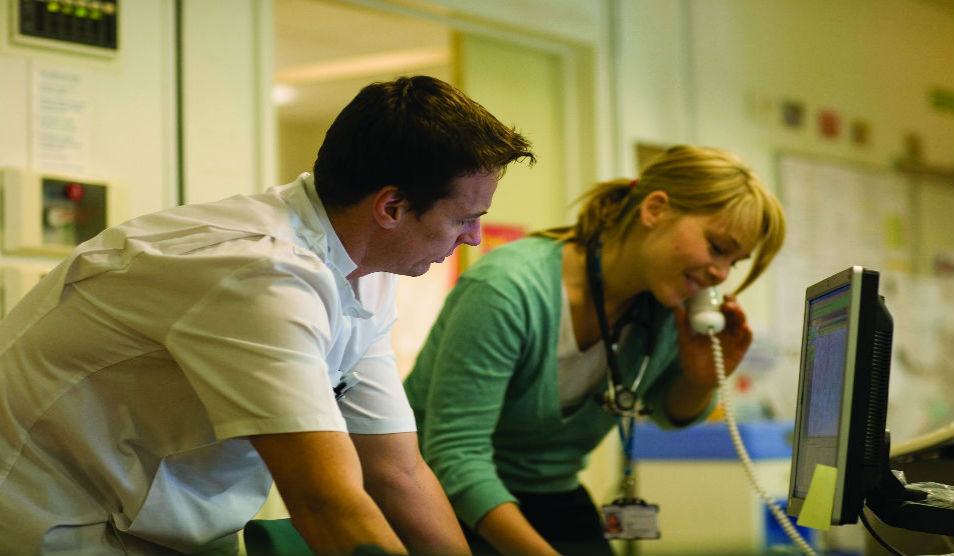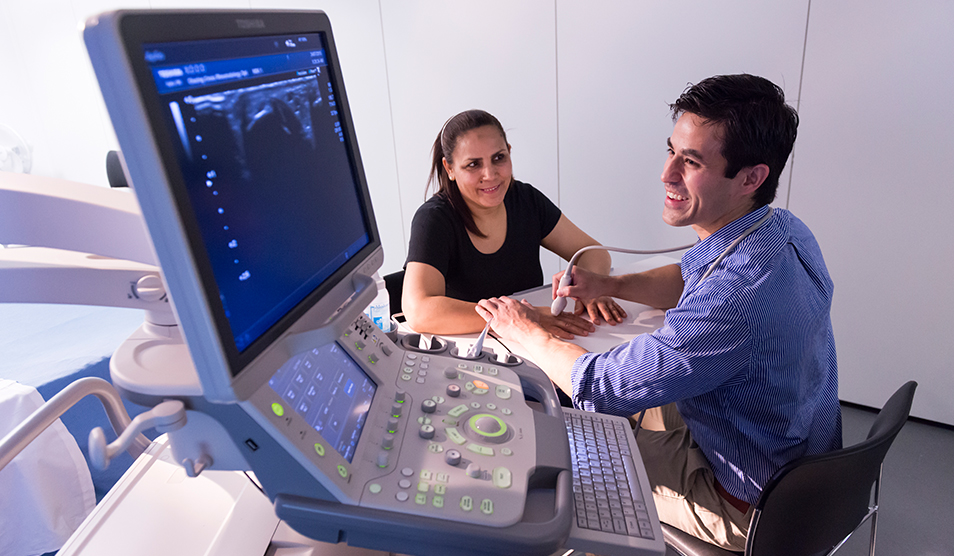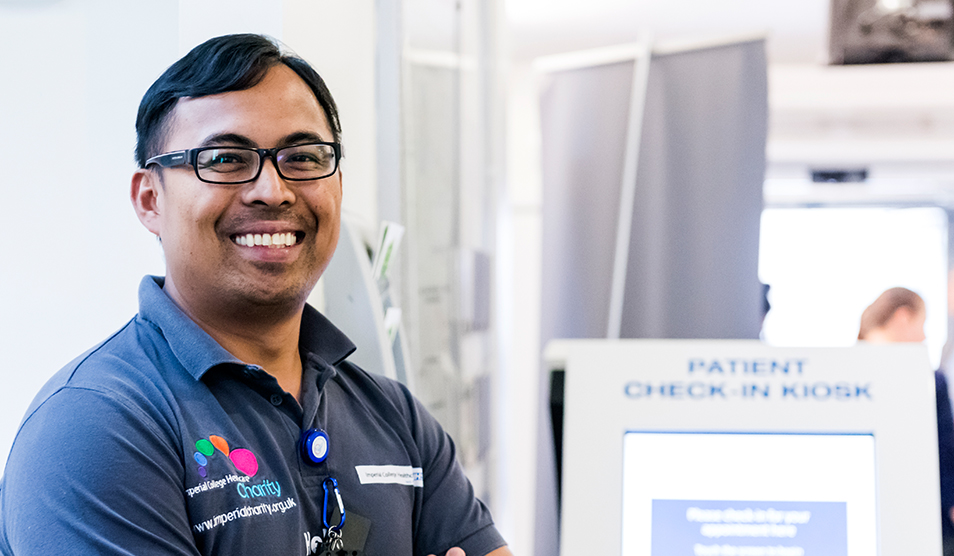New technology partnership to help patient safety and care
** Update: The Trust announced the roll out of the Streams app on 21 January 2019**
Imperial College Healthcare NHS Trust has entered into a new partnership with British technology company DeepMind to help it harness the latest digital technology to support better patient care.
The five-year agreement will see DeepMind and the Trust implement technology for mobile clinical applications (apps), including an application programming interface (API) to manage the secure exchange of information between the Trust’s existing electronic patient record system and mobile apps for patient care. It also covers the deployment of DeepMind’s clinical app called Streams.
Streams provides mobile alerts to doctors when their patient’s condition worsens, helping to ensure that patients receive the right care from the right clinician at the right time. It will also enable clinicians at the Trust to securely assign and communicate clinical tasks, and help provide information they need to make diagnoses and decisions.
This partnership builds on a relationship between the Trust, Imperial College London and DeepMind. The task management features in Streams are underpinned by academic research and early product development carried out at Imperial College London and piloted at the Trust, as part of an app called Hark. Using simulated data, Hark was found to improve the quality of transfer of information between staff and was rated by users as more effective and efficient, and less distracting than pagers. Hark became part of DeepMind in early 2016.
Over the last two years the Trust has moved from paper to electronic patient records. This has enabled patient information to be more readily available to clinicians as they can quickly access the records they need on PCs. Apps are part of the next step in digital technology for healthcare. They have the potential to enhance the value of the electronic patient record system by enabling clinicians to interact with patient records on the move, allowing them to react quickly in response to changing patient needs. The API will allow the apps to work seamlessly together, ensuring that patient data is used safely, securely and consistently.
As well as Streams, the API will enable the Trust to more easily deploy other healthcare apps designed to improve patient safety and care, for example apps to help clinicians locate their patient within the hospital if they have been moved and access their latest diagnostic information.
Dr Sanjay Gautama, Caldicott Guardian and chief clinical information officer for Imperial College Healthcare NHS Trust, said:
“Apps have changed the way we live our lives, from banking to shopping, and they are clearly part of the future healthcare landscape. They bring immense opportunities for faster and more efficient care, by making access to vital information quicker and easier for clinicians. But for apps to be useful and safe they cannot operate in isolation - they need to be securely linked to the core electronic patient record system.
“By working with DeepMind we are embracing the opportunities that technology brings to improve patient care, using their expertise to help us deploy a system that allows us to maximise future innovations in mobile technology for healthcare for the benefit of our patients.”
Professor Ara Darzi, Director of the Institute of Global Health Innovation at Imperial College London and co-inventor of the Hark app, said:
“I am delighted that Imperial College Healthcare NHS Trust has partnered with DeepMind to provide nurses and doctors with digital tools to support them in delivering safe, high quality care to their patients.
“Through the NIHR-funded Imperial Patient Safety and Translational Research Centre (PSTRC), a leading team of patient safety researchers have demonstrated how a failure to provide clinicians with the right information at the right time leads to safety breakdowns and poorer outcomes for patients.
“Working with DeepMind we have been able to translate cutting edge research insights from our Hark research programme into the feature set of the Streams platform. We will be measuring what impact Streams has on patient safety and clinical outcomes over the next couple of years.”
Mustafa Suleyman, Co-Founder of DeepMind, said:
“We’re really excited that Imperial College Healthcare has become our second NHS partner for the Streams app, which we believe has the potential to improve patient safety and save lives. We’ll also be implementing infrastructure to help the Trust to work securely with a wide range of other apps, which we believe will make it far easier to bring the latest innovations to the clinical frontline and really improve patient care.”
Notes to editors
1. Under this agreement, Imperial College Healthcare NHS Trust is the data controller and DeepMind is the data processor which means DeepMind can only process data for the purposes of direct patient care as directed by the Trust.
2. This partnership does not use artificial intelligence (AI) technology and the agreement between the Trust and DeepMind does not allow the use of artificial intelligence.
3. DeepMind was founded in London in 2010. Having been acquired by Google in 2014, it is now part of the Alphabet group. All data is stored securely in a UK-based data centre that has successfully passed NHS audits, and abides by the highest possible standards of security. The data can never be combined with any Google services or accounts under any circumstances.
4. All access to the data is logged, and subject to review by the Trust.
5. The Streams app has been registered as a medical device with the Medicines and Healthcare Products Regulatory Agency.
6. Imperial College Healthcare NHS Trust is the second Trust to work in partnership with DeepMind to deploy Streams and an API, following their agreement with Royal Free NHS Foundation Trust.
Frequently asked questions
Why are you working with DeepMind?
Mobile clinical applications are a growing market and will soon be a key feature of the healthcare landscape as they are in many other sectors. As a leading British technology firm DeepMind has the skills and expertise to help the Trust maximise advances in mobile clinical technology for the benefit of our patients.
The Trust built up its relationship with DeepMind after our academic partner Imperial College London developed an app called Hark to help junior doctors manage and prioritise their clinical task lists. The app was piloted at the Trust and this year became part of DeepMind. The Trust will now deploy DeepMind’s Streams app, which includes a decision support capability that will help to identify patients at risk of deterioration and enable earlier intervention.
Is patient data safe?
Imperial College Healthcare NHS Trust is the data controller and will allow DeepMind (the data processor) to process NHS patient data for the purpose of direct clinical care only as directed by the Trust, in accordance with strict information governance rules and a data processing agreement.
All data is stored by DeepMind securely in a UK-based data centre that has successfully passed NHS audits, and abides by the highest possible standards of security. All access to the data is logged, and subject to review by the Trust.
Are you selling patient data?
No. Information is being processed by DeepMind for the purpose of patient care only. The Trust remains the data controller at all times.
Are you using artificial intelligence (AI)?
This partnership does not use artificial intelligence (AI) technology and the agreement between the Trust and DeepMind does not allow the use of artificial intelligence.
What data does Streams process for Imperial College Healthcare Trust?
DeepMind has not yet started processing data for the Trust, but expects to start in 2017 as the technologies go through clinical safety testing followed by a phased deployment.
Can I opt out?
The Trust has ensured that all necessary information governance and data processing safeguards are in place in compliance with fair processing regulations. Ultimately, mobile applications will become an integral, and unavoidable, part of providing safe and effective care to patients.
What are the benefits to patients of this agreement?
The agreement allows the Trust to develop and utilise the growing market in mobile clinical apps to help improve the care it provides to patients. For example by giving clinicians quick and easy access to diagnostic results and providing mobile alerts when their patient’s condition worsens. Or by helping to streamline the administrative aspects of clinical care.



